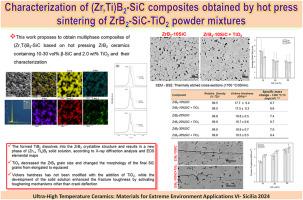Characterization of (Zr,Ti)B2-SiC composites obtained by hot press sintering of ZrB2-SiC-TiO2 powder mixtures
IF 2.9
Q1 MATERIALS SCIENCE, CERAMICS
引用次数: 0
Abstract
The ability to enhance mechanical and oxidation properties for severe environmental applications has led to substantial academic interest in multiphase ultra-high temperature ceramics (UHTC). The purpose of this work is to study the in-situ solid solution formation of (Zr,Ti)B2 from ZrB2 and TiO2 in a ZrB2-SiC composite using hot pressing reaction sintering. For this, a mixture of 10, 20, and 30 % vol% SiC with ZrB2 was mixed with 2.0 wt% TiO2. Hot pressing sintering was performed with a load of 20 MPa at a final temperature of 1850 °C/30 min in an argon atmosphere. The microstructures, crystalline phases, densities, mechanical properties, and oxidation resistance of the composites were examined and compared with ZrB2-SiC samples lacking TiO2. In samples where TiO2 was added, the matrix grain size slightly decreased, the fracture mode was mainly intergranular, and the SiC grain morphology changed the aspect ratio to be more equiaxed. The solid solution (Zr,Ti)B2 was produced, and it was demonstrated by EDS elemental map images and the XRD analysis that Ti atoms incorporate into the ZrB2 crystalline structure. The development of solid solutions showed no impact on relative densities or Vickers hardness. However, the solid solution formation favored an improvement in fracture toughness, probably owing to the smaller matrix grain size and intergranular fracture mode. Samples exhibiting (Zr,Ti)B2 formation presented lower oxidation resistance than undoped samples in the same oxidizing condition.

通过热压烧结 ZrB2-SiC-TiO2 粉末混合物获得的 (Zr,Ti)B2-SiC 复合材料的表征
多相超高温陶瓷(UHTC)能够增强严酷环境应用中的机械性能和氧化性能,因此引起了学术界的极大兴趣。这项研究的目的是利用热压反应烧结技术,研究 ZrB2 和 TiO2 在 ZrB2-SiC 复合材料中原位固溶形成 (Zr,Ti)B2。为此,将体积分数分别为 10%、20% 和 30% 的 SiC 与 ZrB2 的混合物与 2.0 wt% 的 TiO2 混合。热压烧结在氩气环境下进行,最终温度为 1850°C/30 分钟,载荷为 20 兆帕。对复合材料的微观结构、晶相、密度、机械性能和抗氧化性进行了检测,并与不含 TiO2 的 ZrB2-SiC 样品进行了比较。在添加了 TiO2 的样品中,基体晶粒尺寸略有减小,断裂模式主要是晶间断裂,SiC 晶粒形态改变了长宽比,变得更加等轴。固溶体(Zr,Ti)B2 的产生,通过 EDS 元素图和 XRD 分析表明,Ti 原子融入了 ZrB2 结晶结构中。固溶体的形成对相对密度或维氏硬度没有影响。不过,固溶体的形成有利于提高断裂韧性,这可能是由于基体晶粒尺寸和晶间断裂模式较小的缘故。在相同的氧化条件下,形成(Zr,Ti)B2 的样品的抗氧化性低于未掺杂的样品。
本文章由计算机程序翻译,如有差异,请以英文原文为准。
求助全文
约1分钟内获得全文
求助全文
来源期刊

Open Ceramics
Materials Science-Materials Chemistry
CiteScore
4.20
自引率
0.00%
发文量
102
审稿时长
67 days
 求助内容:
求助内容: 应助结果提醒方式:
应助结果提醒方式:


